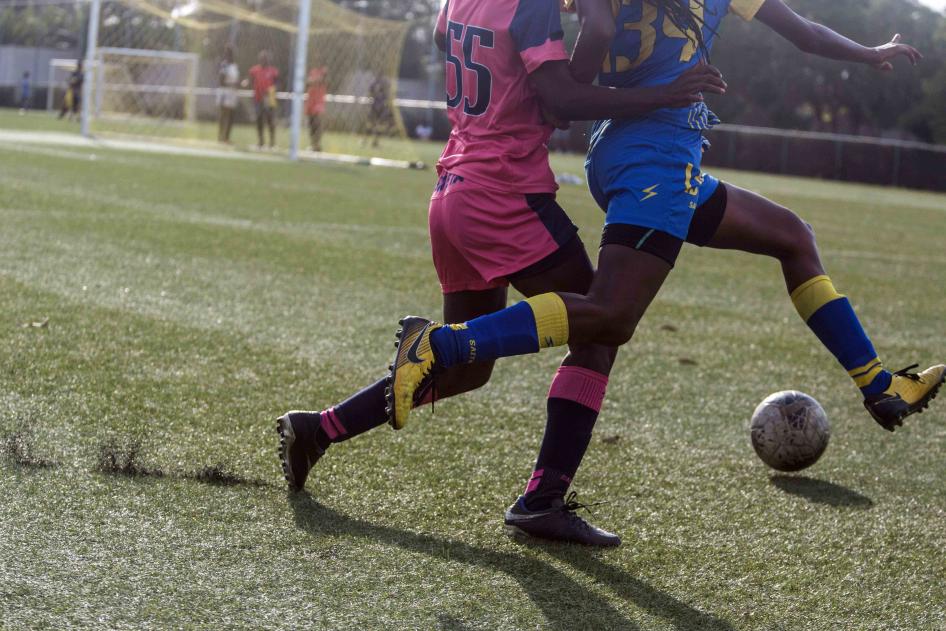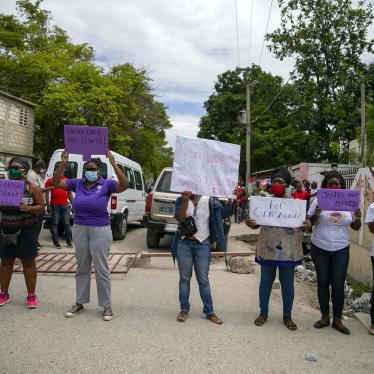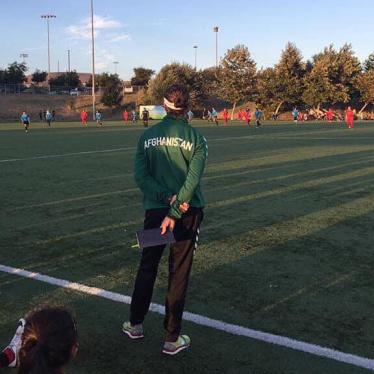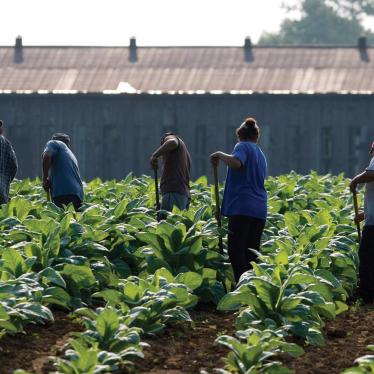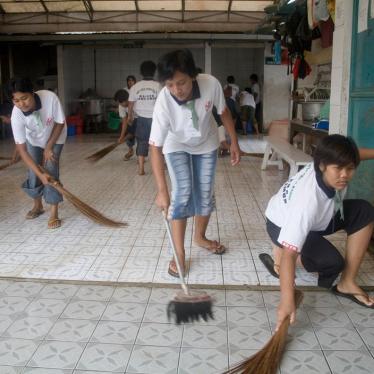(New York) – The International Federation of Association Football (Fédération Internationale de Football Association, FIFA) should permanently ban Haitian Football Federation president Yves Jean-Bart from participating in football, Human Rights Watch said today. On October 15, 2020, FIFA announced that its investigative team completed its report on Jean-Bart, who is accused of raping and committing other sexual abuse of children and young women. On November 22, FIFA’s second 90-day suspension of Jean-Bart expires.
Haitian authorities should effectively investigate these allegations, expeditiously issue relevant charges, and ensure safety for survivors, Human Rights Watch said.
FIFA’s investigation followed multiple allegations that child athletes were subjected to sexual and other abuses at Haiti’s Centre Technique National in Croix-des-Bouquets, also known as “The Ranch.” FIFA’s adjudicatory chamber, which has the authority to hand down a lifetime ban and issue substantial fines, will determine the outcome. FIFA suspended Jean-Bart from “all football activities” in May and extended the suspension on August 20. However, the German broadcaster Deutsche Welle reported that Jean-Bart, also known as “Dadou,” was visiting young academy players at the Ranch “in the middle of the night,” which raises questions about how the suspension is enforced.
“FIFA urgently needs to protect children who are still at risk from Jean-Bart by ensuring his current ban is enforced, fully investigating all other Haitian Football Federation leaders accused of knowing about or facilitating sexual abuse, and cooperating with criminal authorities that pursue these crimes,” said Minky Worden, global initiatives director at Human Rights Watch. “This is not a case of one bad apple. Athletes have testified that many other officials in the Haitian Football Federation – officials responsible for their safety – either participated in sexual abuse or knew and turned a blind eye.”
Since May, Human Rights Watch has interviewed numerous witnesses and collected evidence of systemic human rights abuses in Haitian football, including confiscation of players’ passports, labor rights abuses, grooming child athletes for sexual exploitation, and threats to kill witnesses and survivors. FIFA’s independent Ethics Tribunal has had its own team on the ground in Haiti, and Human Rights Watch has worked with FIFA’s human rights team to ensure that trauma therapy is provided to survivors and that witnesses could be protected, and has provided evidence of specific abuses to FIFA, while protecting survivors’ identities.
Jean-Bart has been Haiti’s football federation president since 2000 and was re-elected to a sixth term in February 2020. He also oversees youth, men, and women’s teams and training, and a girls’ team called the Tigresses, which he founded in 1972. Jean-Bart has publicly denied all allegations against him.
FIFA suspended two other federation staff in August and one in October, making a total of four officials now under FIFA investigation for allegedly participating in the sexual assaults of players and other crimes. Human Rights Watch is aware of complaints against at least five other senior federation officials, including allegations of abuse of athletes and referees. Three of those senior officials were named in a report by The Guardian newspaper which confirmed that Fenelus Guerrier, Garry Nicholas, and Rosnick Grant, a federation vice president who is also head of the national referees’ commission, are under investigation.
Multiple football players told Human Rights Watch that Guerrier took their passports or that Jean-Bart held them, a practice associated with human trafficking, captivity, and control. Athletes told Human Rights Watch that this led to manipulation, coercion, and a terrifying cycle of abuses. Without their passports, they said, they could not flee to safety to disclose abuse. Many former athletes said their passports were never returned. “Holding my passport is a way to ensure my silence,” said one former player.
“While monitoring conditions at the Ranch, we learned that federation officials took documents considered sensitive, including 11 passports of female players from various football clubs,” said Pierre Esperance, the executive director of National Network for the Defense of Human Rights (Réseau National de Défense des Droits Humains, RNDDH), which published a report about alleged sexual abuse at Haiti’s football federation. “These passports later ended up in the hands of Yves Jean-Bart, which means he could extort and silence victims and witnesses.”
In Haiti, women and girls struggle to get justice, and gender-based violence is a widespread problem. Haiti does not have specific legislation against domestic violence, sexual harassment, or other forms of violence targeted at women and girls. Rape was only explicitly criminalized in 2005, by ministerial decree.
In 2017, Haiti’s Ministry of Health released a survey saying that one in eight Haitian women reported experiencing sexual violence at some point in their lives. According to the Violence against Children in Haiti National Survey in 2012, “1 out of 4 females and 1 out of 5 males in Haiti have experienced at least one incident of sexual abuse prior to the age of 18 years.” Human Rights Watch has long documented how women and girls in Haiti seeking accountability for sexual violence encounter multiple obstacles, including stigma and threats. Some survivors experience reprisals for filing criminal complaints, leading them to drop charges.
FIFA contributes $1.5 million annually to each football federation under the “FIFA Forward” program. This substantial sum was to support the development of women’s soccer in Haiti, but influential officials within Haiti’s football scene were able to manipulate the funds to create a system of sexual exploitation and human trafficking. Such funding programs urgently need safeguards to prevent enhancing power imbalances that facilitate exploitation of young athletes and to ensure protection of those athletes’ human rights, Human Rights Watch said.
In light of the egregious abuse of children and adult athletes at the hands of officials at the Haitian Football Federation, Human Rights Watch made the following recommendations:
- FIFA should create effective measures to ensure the safety of all who participate in football in Haiti. This includes putting in place a temporary normalization committee and attaching strong contractual conditions to future funding grants.
- FIFA should hold accountable all those involved in abuse, through disciplinary sanctions, up to and including a permanent ban, proportionate to the gravity of the abuse and the officials’ or members’ involvement. It should fully cooperate with any parallel criminal investigations to ensure justice for the abuse survivors, and establish a process to ensure they receive adequate reparations for the harm they suffered.
- FIFA should make an unequivocal commitment to ensuring that football leaders, who are responsible for “responding to concerns about a child,” are held to account when they fail to do so. As of 2019, all football federations are required to have confidential reporting structures, and “at a minimum, identify a lead officer for child safeguarding.” FIFA should ensure that its FIFA Guardians program “guidelines for identification, prevention and mitigation of risk to children involved in football” are effectively implemented in Haiti and beyond in FIFA’s 211 member associations.
Human Rights Watch calls on Haiti’s international donors, including the United States government, to insist on a comprehensive response to gender-based violence in sports, including measures for prevention, monitoring, support for survivors, and accountability for abusers. International agencies such as the International Labour Organization should report on and seek to set up systems to remedy child labor and workplace abuses exposed in the football federation.
Finally, the government of Haiti should take urgent steps to fully investigate the alleged abuses, including by immediately opening a judicial investigation into the allegations, holding all those responsible to account, and ensuring reparations to the survivors. Haiti should ensure witness protection and safety for survivors. To date, Yves Jean-Bart has been questioned by a district attorney in Haiti but not yet charged with any crime.
Haiti’s 2020 criminal code reforms that criminalize sexual assault and gender-based violence are an important step forward. While they will not go into effect until 2022, the articles referring to sexual violence and assault should help guide judicial authorities on elements of the alleged crimes to be considered.
“Many athletes and referees in Haiti have had to endure terrible crimes to participate in football,” Worden said. “Their courage in stepping forward to report to FIFA is inspiring and humbling. FIFA’s leaders should match this with bold and effective actions to remedy the abuses and institute strong prevention measures, so no other children suffer as these did.”
